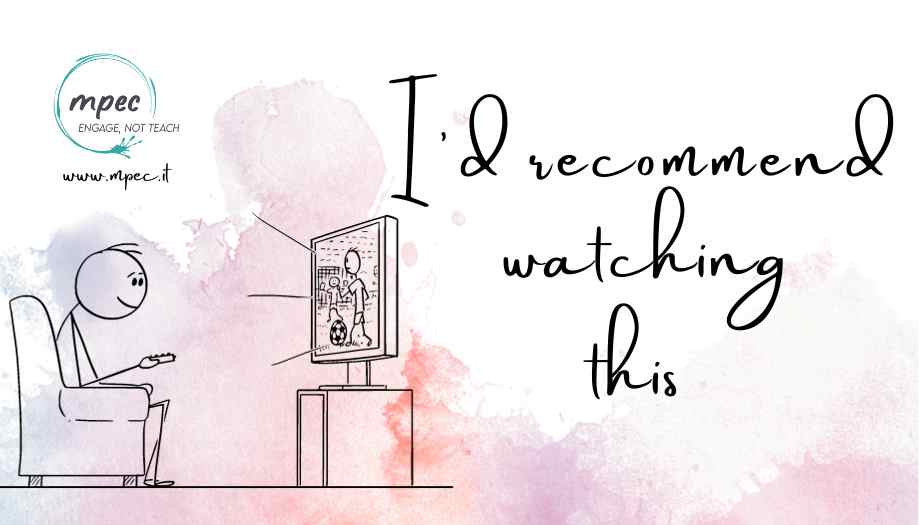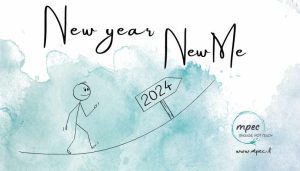Welcome to our engaging session where we dive into the world of entertainment! Today’s topic is “Movies or TV Shows You Enjoy – Making Recommendations Using Negative Questions and Modal Verbs.” This is a great opportunity to share your favorite films and series while practicing a unique aspect of English conversation: framing recommendations through negative questions and the use of modal verbs. Whether you’re a fan of thrilling dramas, laugh-out-loud comedies, or thought-provoking documentaries, let’s chat about what captivates us on screen and how to recommend them to others in a nuanced way.
Prepared for you by: My Personal English Coach
Non sai da dove iniziare?
Not sure where to start?
Today, we want to make sure you use different types of questions during your conversation club session. Here is some Key Grammar Explanation:
Negative questions are often used when the speaker is more certain of the answer or is expecting agreement. For example, “Isn’t [Movie/TV Show] underrated?” implies that the speaker believes it is underrated and is seeking validation of this belief. In contrast, affirmative questions are more open-ended and do not suggest a presumed answer. They are used to elicit a more unbiased response.
- Negative questions to seek agreement (e.g., “Isn’t it underrated that…”, “Isn’t it overlooked how…”)
- Affirmative questions for open response (e.g., “What is your view on…”, “Do you believe that…”)
Round 1: Sharing Favourites
First, make sure you and your conversation partner both watched the movie and broadly have the same or similar views on it. Then, you will follow up with the questions below.
- “Isn’t it amazing how [Movie/TV Show] can make you [feel … think… reflect on…]? (Eg: Isn’t it amazing how Matrix makes you reflect on what is real and what isn’t?)
- “Haven’t you found [Movie/TV Show] to be [description]?”
Key Grammar/Vocabulary Expressions:
- Modal verbs for suggestions (e.g., “You should watch…”, “You might enjoy…”)
- Negative questions for emphasis (e.g., “Isn’t it just the best when…”, “Haven’t you also noticed…”)
- Descriptive adjectives (e.g., “thrilling”, “heartwarming”)
- Emotive language (e.g., “captivating”, “mind-blowing”)


Round 2: Discussing Movie Preferences
- “What genre of movies do you generally prefer and why?”
- “Are there any particular movie elements or themes that you always find appealing?”
Key Grammar/Vocabulary Expressions:
- Preferences: Expressing personal choices (e.g., “I prefer…”, “My favorite genre is…”)
- Reasons for liking: Explaining why you like something (e.g., “I enjoy… because…”, “What appeals to me is…”)
- Particular elements: Specific aspects of movies (e.g., “I’m drawn to films with…”, “I have a soft spot for…”)
- Describing tastes: Talking about personal tastes (e.g., “I have a taste for…”, “I’m fond of movies that…”)
Round 3: Tailored Recommendations
Before trying these conversation starters, you should first ask a broader question about the other person’s watching preferences and favourite genres. Then, you can follow up with your tailored recommendation:
- “You might enjoy [Movie/TV Show] if you’re into [specific genre/theme]. Have you heard of it?”
- “I think you should check out [Movie/TV Show] if you’re a fan of [specific aspect/actor/director]. What do you think?”

Key Grammar/Vocabulary Expressions:
- “You might enjoy…”: For suggesting based on perceived interest.
- Example: “You might enjoy ‘The Crown’ if you’re into historical dramas.”
- “I think you should…”: For making a stronger recommendation.
- Example: “I think you should watch ‘Stranger Things’ if you like sci-fi mysteries.”
- Discussing genres/themes: Tailoring suggestions to specific tastes.
- Example: “For fans of thrillers, you should try…”
- Personalised recommendation: Connecting the recommendation to someone’s known preferences.
- Example: “You might like ‘Inception’ if you enjoy complex storylines.”
Remember – there is always more! Here is your Follow Up Video:
#SpeakUp #SelfAdvocacy #TEDTalks #CommunicationSkills #PersonalDevelopment
MoviesPreferences, FilmGenres, PersonalTastesInMovies, MovieElements, FavoriteMovies, MovieThemes, CinemaLovers, DiscussingFilms, MovieTastes, IndividualMoviePreferences, ExploringCinema, MovieDiscussion, FilmFavourites, GenrePreferences, MovieEnthusiasts, UnderstandingCinemaTastes, PersonalFilmChoices, TalkingAboutMovies, MovieGenrePreferences, CinemaPreferences
#MoviesPreferences #FilmGenres #PersonalTastes #FavoriteMovies #MovieThemes #CinemaLovers #DiscussingFilms #MovieTastes #CinemaDiscussion #FilmFavorites #MovieEnthusiasts #CinemaTastes #FilmChoices #TalkingMovies #GenrePreferences #MovieLovers #FilmDiscussions #ExploreCinema #MovieGenres #LoveForMovies







